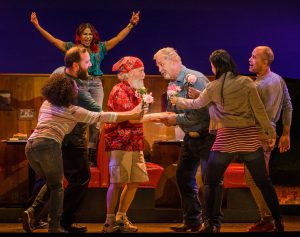A Road-Trip Helps the Healing in ‘Miss You Like Hell’ at LJ Playhouse
As I write this, the most tiresome and degrading national election of my long life is still underway. By the time you read this, we should have a better vision of how far we still must go in addressing the epic issues of our era.
A new drama premiering at the La Jolla Playhouse concentrates on one of the most vexing of these issues, the cruelty of borders. In Miss You Like Hell, a mother and her daughter, torn apart by grinding, everyday rules and contagious doubt, grope for hope, sustained mainly by others each wounded in their own ways.
The events in this play could be happening right down the row from us at the Mandell Weiss Theatre, but variations of the play’s basic question always surround us and soak our own lives: How are we going to deal with all this?
The authors – Quiara Alegria Hudes and Erin McKeown – seem to murmur, “Together? If we only work together and trust our humanity, maybe we can find the right way…” And they proceed with the story of the Latina mom and her damaged daughter on their ramshackle road-trip from Philadelphia back to Los Angeles, trusting that the wider issues will find buoyancy in the broad skies above our wide land.

Krystina Alabadfo, left, and Daphne Rubin-Vega in Miss You Like Hell at the La Jolla Playhouse. Jim Carmody Photo
It’s a well-travelled road, from Alexis de Tocqueville and Mark Twain through Woody Guthrie and Jack Kerouac to “Easy Rider” and “Thelma and Louise.” And it welcomes Beatriz in her impulsive dash east to rescue Olivia, whose Yankee-pure father referred to Beatriz all through the divorce as an “alien,” thus winning sole custody.
Olivia is a mess, ignored by her distracted father and raised mostly by the Internet into an early-blooming loner known for her bottomless supply of condoms. Her real world is a blog of followers who vicariously follow her vivid, wide-ranging fantasy literary world of Prometheus myths, Tolstoy, Tolkien and a predictable roster of outsider all-stars. When Beatriz, who has long since sniffed out her daughter through all the levels of anonymous identity, reads in the blog the first references to suicide, she puts her immigration battles on hold and heads east.
Not only must she persuade Olivia to come with her – the girl has always wanted to visit the buffalo in Yellowstone Park – Beatriz also must answer for the years of separation: Did she fight enough for custody? Why did run away west? Why didn’t she even try to teach Olivia Spanish? What does she want now? The questions overflow like a backed-up toilet.
In her defense, Beatriz can offer only her overwhelming, elemental maternal drives. She must absorb the abuse to become a refuge. The girl doesn’t understand basic personal hygiene but the real challenge is far more daunting: helping her find female dignity and self-respect.
While dodging the law.
There’s a deportation hearing awaiting Beatriz in LA. She has a good lawyer but she also has a record, a bust decades earlier for smoking a joint in a National Park. It was only a misdemeanor but it needs to be erased to give her the best chance, says her lawyer.
So that’s the quest: Return to a court in South Dakota while pulling her only child back from the abyss. Heady stuff on so many levels.
Hudes wrote the book and McKeown is the composer. They collaborated on the lyrics and they brought director Lear deBessonet into the mix early. There may be a feminist mission involved but the play’s propellant is more potent and universal than that. In fact, there’s nothing much in the way of formal form, just these two complicated women and the mess they’re stuck with.
As their pickup putts its way westward, they meet people. Some are from Olivia’s blog while others, like the Peruvian tamale vendor in the Dakotas or the two guys celebrating their long life together by getting married again in every state possible, just seem to happen.
There’s a dreamy, almost goofy haze over the days. Despite a lack of specifics, things do seem to be working out. Nobody’s totally evil and almost everybody eventually helps, even if it’s just with a Styrofoam cup of warm milk. Faces along the way include Rosa Parks, Alan Ginsberg, Elvis, Col. Sanders, Marilyn Monroe, a cowboy with butterflies and so forth.
Though there is a resolution to Beatriz’ case, there’s no end to the story. The latter parts will be familiar, sometimes sadly so, to local audiences. And the border fence does indeed look like some endless, obscene dragons, topping the hills and sliding into the ocean.
Daphne Rubin-Vega plays Beatriz like a Latina Mother Courage but doesn’t let the mission get in the way of the fun, which she is careful to emphasize by her absorbing grip on both edges. Krystina Alabado as Olivia, dealing deftly with all the clichés of the misunderstood prodigy, avoids the more extravagant agonies yet stands her ground even as it crumbles.

David Patrick Kelly, center left, and Cliff Bemis are an old couple in Miss You Like Hell at the La Jolla Playhouse. Jim Carmody Photo
Eight other busy actors march through the supporting roles in Danny Mefford’s brisk, insouciant choreography brought around nicely when deBessonet’s staging requires something more personal and intimate. It’s meat and potatoes for quick-witted actors such as Cliff Bemis and David Patrick Kelly, as the happy couple; Julio Monge as the tamale artist; Vanessa A. Jones as a formidable attorney and patient waitress; Olivia Oguma as another girl dreamer with sadly pinched horizons; and Kurt Norby, who makes some minor authorities human despite their jobs.
The musical balances and drive are admirable throughout, with McKeown’s eclectic mix of styles and effects delivered smoothly by Julie McBride and six colleagues, in arrangements by the composer and Charlie Rosen.
The separate songs are hard to sort out but I particularly enjoyed the guys’ marriage hoedown and a pushy anthem on the concept “Life Fights for Life.” Without in any way dismissing the heft of a very contributing score, it’s also true that the music, like the canny staging and dances, submerges into the texture of this intriguing but solid work.
So too the décor, a La Jolla Playhouse signature mix of monumental bones with chunks of specific muscle as needed. Donyale Werle designed what sticks in memory as a romantically colorized postcard from the plains (thanks Tyler Micoleau for the lights) populated by folks all dressed up (and sometimes overdressed) for American Fun by Emilio Sosa.
In all this jaunty romp, the sober issues of the day are never far away. I don’t know if the LJP exactly planned the timing, but Miss You Like Hell is a mighty effective comment on the era we inhabit and the punishing election we have endured, proving once again the power of theatre to join and maybe even lead the discussion.
I really want to think that our civilization can move on with the mutual respect and shared purpose the authors include in their vision here.

Welton Jones has been following entertainment and the arts around for years, writing about them. Thirty-five of those years were spent at the UNION-TRIBUNE, the last decade was with SANDIEGO.COM.


